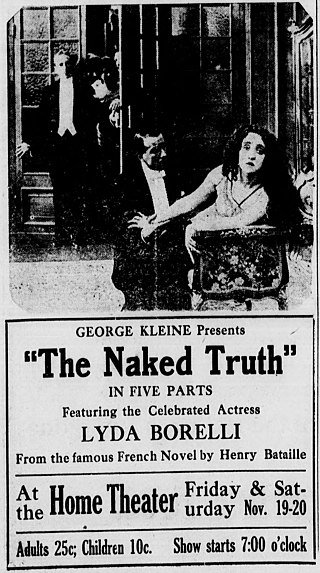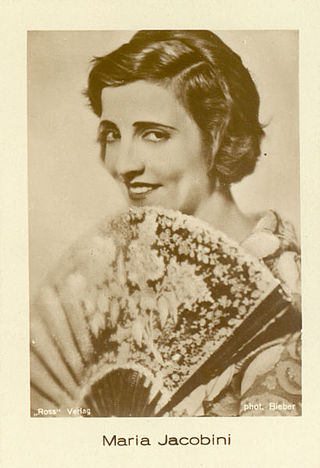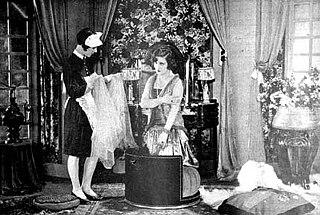Related Research Articles

The Naked Truth is a 1914 silent Italian drama film directed by Carmine Gallone.

Flower of Evil is a 1915 silent Italian drama film directed by Carmine Gallone. The film was shown as part of the Silent Divas of the Italian Cinema programme at the 38th New York Film Festival in 2000.

Enrico Guazzoni was an Italian screenwriter and film director. Guazzoni was the uncle of Jolanda Kodra, an Italian-Albanian writer and translator.

Elena Sangro was an Italian actress.

Maria Jacobini was an Italian film actress. She was married to the film director Gennaro Righelli and appeared in many of his silent films for the Vesuvio Film Company. She worked in the German film industry in the mid-1920s. She was the older sister of actress Diomira Jacobini.

Marie Antoinette, the Love of a King is a 1922 German silent historical drama film directed by Rudolf Meinert and starring Diana Karenne, Maria Reisenhofer and Gustav May. The film depicts the life of Marie Antoinette, Queen of France, during the years leading up to and during the French Revolution in which she was executed.
Andrea Habay (1883–1941) was a French film actor. Habay appeared in more forty films during the silent era, mostly in Italy. He also directed three films during the early 1920s. He played the role of Petronius in the 1924 epic Quo Vadis, one of his final films.

Ruggero Ruggeri was an Italian stage and film actor. Ruggeri was a celebrated theatre actor, appearing alongside Lyda Borelli on stage in 1909. From 1914 onward he sporadically made films in both the silent and sound eras.

A Woman's Story or The Story of One Woman is a 1920 Italian silent drama film directed by Eugenio Perego and starring Pina Menichelli, Luigi Serventi and Livio Pavanelli. A single mother has to work as a high-class prostitute.

The Railway Owner is a 1919 Italian silent drama film directed by Eugenio Perego and starring Luigi Serventi, Maria Caserini and Amleto Novelli. It is based on Georges Ohnet's novel Le Maître de Forges.
The Story of a Poor Young Man is a 1920 Italian silent drama film directed by Amleto Palermi and starring Luigi Serventi, Pina Menichelli and Antonio Gandusio. It was one of numerous film adaptations of Octave Feuillet's novel of the same name.
The Second Wife or The Second Mrs. Tanqueray is a 1922 Italian silent drama film directed by Amleto Palermi and starring Pina Menichelli, Elena Lunda and Alfredo Martinelli. It is an adaptation of Arthur Wing Pinero's 1893 British play The Second Mrs Tanqueray, about a woman who struggles to overcome rumours about her past.
Take Care of Amelia is a 1925 Italian silent comedy film directed by Telemaco Ruggeri and starring Pina Menichelli, Marcel Lévesque and Elena Lunda. It is based on the 1908 play Occupe-toi d'Amélie! by Georges Feydeau, which has been made into several films. It was the final film to star Menichelli, one of the leading divas of early Italian cinema.

Guglielmo Zorzi (1879–1967) was an Italian screenwriter and film director.
The Closed Mouth is a 1925 Italian silent film directed by Guglielmo Zorzi.
Augusto Bandini was an Italian film actor. He appeared in more than forty productions, the majority of them during the silent era.
Mario Roncoroni was an Italian film actor and director active during the silent era. During the late 1920s he worked in the Spanish film industry.

Linda Albertini was an Italian silent film actress. She starred in adventure films and was originally a circus acrobat. She is noted for playing a newly emerging female role during and after the First World War, which had been characterized as a strong, dauntless, and athletic woman.
Red Love is a 1921 Italian silent drama film directed by Gennaro Righelli and starring Maria Jacobini, Amleto Novelli and Arnold Kent. It was shot at the Fert Studios in Turin.

The Carnival of Venice is a 1928 Italian silent drama film directed by Mario Almirante and starring Maria Jacobini, Malcolm Tod and Bonaventura Ibáñez. The film's sets were designed by the art director Giulio Lombardozzi.
References
- ↑ Dalle Vacche, Angela. "Diva: Defiance and Passion in Early Italian Cinema". University of Texas Press. Retrieved October 25, 2019.
- ↑ "Angela Dalle Vacche". School of Literature, Media, and Communication. Retrieved October 25, 2019.
- ↑ Dalle Vacche, Angela (19 April 2016). The Body in the Mirror: Shapes of History in Italian Cinema. Princeton University Press. ISBN 9780691637549 . Retrieved October 27, 2019.
- ↑ "Angela Dalle Vacche: CV". Georgia Tech. Retrieved October 27, 2019.
- ↑ "THE ART THAT INSPIRED THEM IN 2000". Artforum (Best of 2000). December 2000.